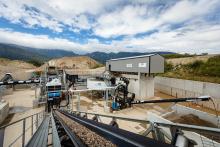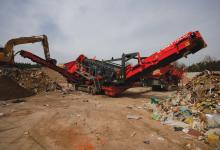SMR (UK), a leading UK soil stabilisation specialist, in partnership with Richardson Recycling, hosted an industry open day to present the benefits of using Structural Material for Reinstatement (SMR).
With recycling targets for construction and civil engineering companies being set ever higher, the two companies hosted leading reinstatement specialists and senior officers from the (counties) Suffolk and Norfolk Highways Department to a demonstration showcasing how excavated material can be transformed into a highly effective recycled sub-base product.
SMR produces a specially formulated dry mix powder, which when added to excavated spoil material, is transformed in minutes into the high quality sub-base, SMR.
With typically 2% by volume of the SMR material being combined with excavated spoil using mobile screeners and batch mix equipment, the resulting chemical reaction dries out and stabilises the material for optimum compaction.
It is said that the soil particles become bonded together, increasing the density and strength of the soil by as much as 600%, resulting in a high quality structural reinstatement material being created which consistently outperform traditional materials such as Type1 GSB.
During the open day, held at the Morningthorpe Quarry headquarters of Richardson Recycling, Norwich, eastern England, attendees were introduced to the speed at which material brought in from the highways could be recycled into a useable sub-base using the new mobile screening and batching unit which was designed and built by Richardson’s specifically for this purpose.
“With sustainability high on the agenda, many utility companies in the UK are now turning to SMR to better use excavated material,” says Andy Bareham, technical support manager at SMR (UK).
“To date, we have been instrumental in helping contractors divert over two million tonnes of excavated material from landfill using the SMR product. Clancy Docwra, one of our partners attending today’s event, is currently using SMR on the Anglian Water (Integrated Maintenance and Repair) contract.
“To date over 36,000tonnes of excavated material has been diverted from landfill amounting to £486,000 saved on tipping fees alone, without calculating other savings related to transportation and waiting time.”
From April 2017, the UK landfill tax increased to a standard rate of £86.10/tonne with an inert rate of £2.70/tonne (and this is expected to increase again in 2018 assuming no policy change).
The actual cost of non-hazardous soil disposal also varies across the country, typically costing around £20-£50/tonne, with the cost of disposing contaminated soil being significantly higher.
Transport costs further push the cost of disposing of waste material and with heavy diesel transport operators being increasingly penalised for inner city movements, reusing materials where they were excavated makes sound environmental sense.






